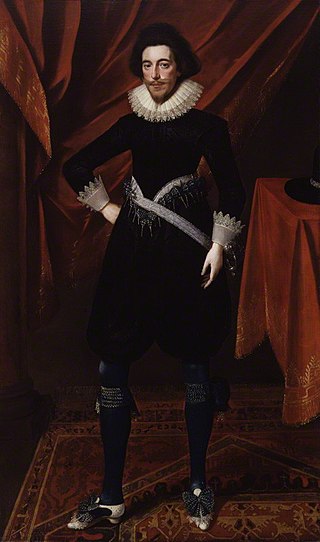
The English Civil War refers to a series of civil wars and political machinations between Royalists and Parliamentarians in the Kingdom of England from 1642 to 1651. Part of the wider 1639 to 1653 Wars of the Three Kingdoms, the struggle consisted of the First English Civil War, the Second English Civil War and the Third English Civil War. The latter is also known as the Anglo-Scottish war, since most of the fighting took place in Scotland.

1650 (MDCL) was a common year starting on Saturday of the Gregorian calendar and a common year starting on Tuesday of the Julian calendar, the 1650th year of the Common Era (CE) and Anno Domini (AD) designations, the 650th year of the 2nd millennium, the 50th year of the 17th century, and the 1st year of the 1650s decade. As of the start of 1650, the Gregorian calendar was 10 days ahead of the Julian calendar, which remained in localized use until 1923.

Robert Devereux, 3rd Earl of Essex, KB, PC was an English Parliamentarian and soldier during the first half of the 17th century. With the start of the Civil War in 1642, he became the first Captain-General and Chief Commander of the Parliamentarian army, also known as the Roundheads. However, he was unable and unwilling to score a decisive blow against the Royalist army of King Charles I. He was eventually overshadowed by the ascendancy of Oliver Cromwell and Thomas Fairfax, and resigned his commission in 1646.

The Battle of Naseby took place on 14 June 1645 during the First English Civil War, near the village of Naseby in Northamptonshire. The Parliamentarian New Model Army, commanded by Sir Thomas Fairfax and Oliver Cromwell, destroyed the main Royalist army under Charles I and Prince Rupert. Defeat ended any real hope of Royalist victory, although Charles did not finally surrender until May 1646.
The Vicar of Bray is a satirical description of an individual fundamentally changing his principles to remain in ecclesiastical office as external requirements change around him. The religious upheavals in England from 1533 to 1559 made it impossible for any devout clergyman to comply with all the successive requirements of the established church. The original figure was the vicar Simon Aleyn, although clerics who faced vicissitudes resulted in revised versions of the story.

George Monck, 1st Duke of Albemarle KG PC JP was an English soldier, who fought on both sides during the Wars of the Three Kingdoms. A prominent military figure under the Commonwealth, his support was crucial to the Restoration of Charles II in 1660, who rewarded him with the title Duke of Albemarle and other senior positions.

Henry Ireton was an English general in the Parliamentarian army during the Wars of the Three Kingdoms, and the son-in-law of Oliver Cromwell. He died of disease outside Limerick in November 1651.
"The Vicar of Bray" is an eighteenth century satirical song recounting the career of The Vicar of Bray and his contortions of principle in order to retain his ecclesiastic office despite the changes in the Established Church through the course of several English monarchs. The song is particularly interesting because of the number of allusions to English religious and political doctrines and events crammed into it, justifying the close reading and annotation given here.

The Second English Civil War took place between February and August 1648 in England and Wales. It forms part of the series of conflicts known collectively as the 1639–1653 Wars of the Three Kingdoms, which include the 1641–1653 Irish Confederate Wars, the 1639–1640 Bishops' Wars, and the 1649–1653 Cromwellian conquest of Ireland.

Cromwell is a 1970 British historical drama film written and directed by Ken Hughes. It is based on the life of Oliver Cromwell, who rose to lead the Parliamentary forces during the later parts of the English Civil War and, as Lord Protector, ruled Great Britain and Ireland in the 1650s. It features an ensemble cast, led by Richard Harris as Cromwell and Alec Guinness as King Charles I, with Robert Morley as Edward Montagu, 2nd Earl of Manchester and Timothy Dalton as Prince Rupert of the Rhine.

The Battle of Rathmines was fought on 2 August 1649, near the modern Dublin suburb of Rathmines, during the Irish Confederate Wars, an associated conflict of 1638 to 1651 Wars of the Three Kingdoms. It has been described as the 'decisive battle of the Engagement in Ireland.'
Events from the year 1645 in England. This is the fourth year of the First English Civil War, fought between Roundheads (Parliamentarians) and Cavaliers.
Events from the year 1658 in England.

Cornwall played a significant role in the English Civil War, being a Royalist enclave in the generally Parliamentarian south-west.

The Battle of Preston, fought largely at Walton-le-Dale near Preston in Lancashire, resulted in a victory for the New Model Army under the command of Oliver Cromwell over the Royalists and Scots commanded by the Duke of Hamilton. The Parliamentarian victory presaged the end of the Second English Civil War.
Richard Molyneux, 1st Viscount Molyneux (1594–1636) was an English politician who sat in the House of Commons at various times between 1614 and 1629.
This is a timeline for the English Civil War in Shropshire.

Oliver Cromwell was an English military and political leader and later Lord Protector of the Commonwealth of England, Scotland and Ireland.
The battle of Bovey Heath took place on 9 January 1646 at Bovey Tracey and Bovey Heath during the First English Civil War. A Parliamentarian cavalry detachment under the command of Oliver Cromwell surprised and routed the Lord Wentworth's Royalist camp.













